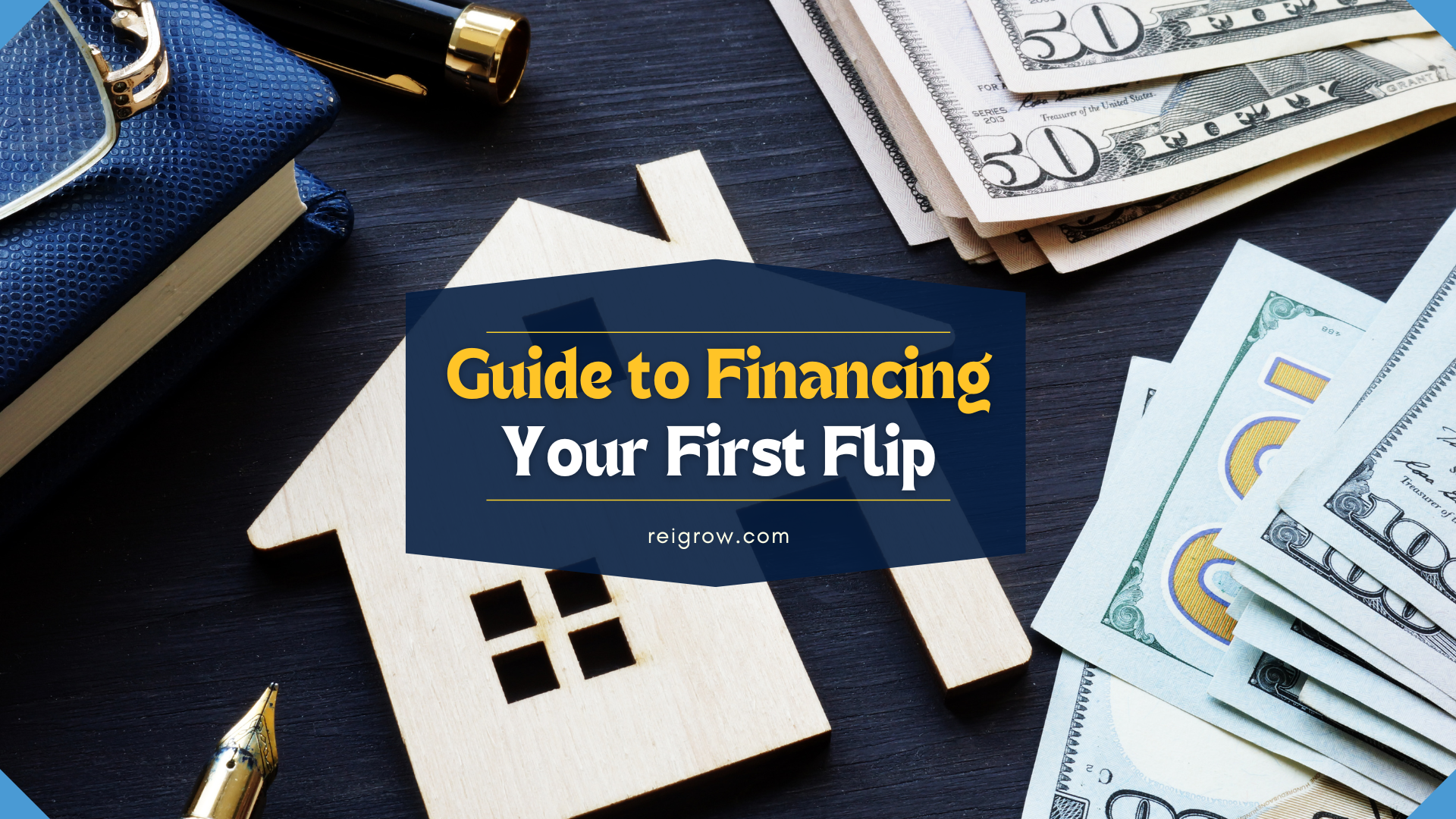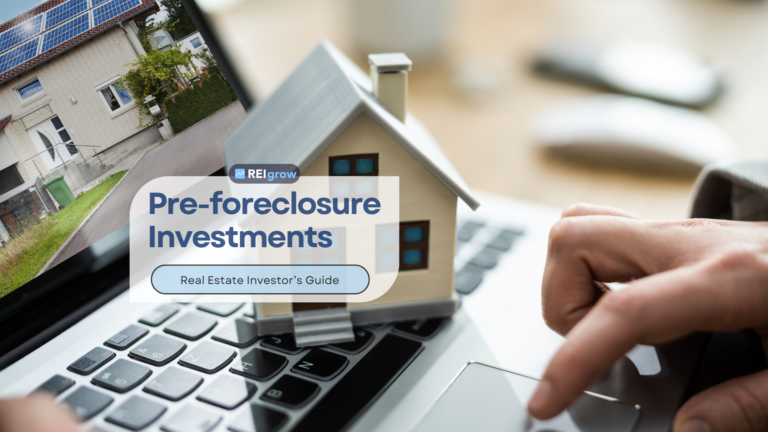REI Guide to Financing Your First Flip
Are you looking for ways to finance your first flip? Considering a conventional loan for flipping houses? From house hacking to tax-deferred financing mechanisms, there are different ways to secure the funding you need for your fix-and-flip project.
Each financing method has its considerations and merits. Therefore, a thorough understanding of your financing options and the overall house-flipping financial model is necessary for a successful start in house flipping.
You can set yourself up for a successful flip if you diligently follow the standard house-flipping checklist, avoid common mistakes that new flippers often make, and avail of the best fix-and-flip loans available.
The right financing can make all the difference in turning your flip into an opportunity to turn in profits.
Key Takeaways
- Cash financing offers a negotiation advantage and higher profits.
- Seller financing provides lower interest rates and flexibility.
- Personal loans for house flipping finance help ensure fast approval and cover various costs.
- HELOC or cash-out refinance option provides flexibility in managing finances for a house-flipping project.
- Cash, seller financing, or personal loans are typically known for flexible terms that may not require a traditional lender.
- Quick private money loans for flipping houses may be suitable if you need fast funding with a detailed returns plan.
- Conventional loans, hard money, or peer-to-peer options should be evaluated based on the specific needs for financing your first flip.
How to Finance a Flip – Regardless of the Occupancy Status
When you’re thinking about financing your house-flipping project, you have a few options no matter if it’s occupied or not.
You can use cash, get seller financing, take out personal loans, tap into a HELOC on your main home, or consider a HELOC or cash-out refinance on the property itself.
Each choice has unique factors to weigh. So, carefully assess your money situation and real estate investment goals before you make a final decision.
Using Cash for Funding a Flip
When you use cash to fund your flip, you gain flexibility and speed in buying properties, whether the property is occupied or not.
Here are the chief advantages of using cash to finance your first flip:
- Ability to Purchase Immediately: Immediate availability of cash means that you don’t have to wait for mortgage approvals.
- Better Bargaining: Cash buyers can negotiate better deals as sellers want to complete a transaction as quickly as possible.
- No Interest Fees: With cash, you skip interest costs from home flipping loans; this can boost your profits.
- Quick Investment Moves: Cash in hand allows you to seize good opportunities promptly once you learn how to find house-flipping deals.
Seller Financing
This financing option allows the property owner (potential seller) to act as the lender; thus, you can buy the property you want to flip and pay them directly over time, without having to opt for a traditional mortgage loan for flipping a house.
Seller financing can be a good option for house flippers, especially if the property isn’t occupied.
It offers flexibility in terms like down payment, interest rate, and repayment schedule, which can be more tailored to your needs.
This method is particularly useful if you face challenges getting mortgage loans for house flipping through regular channels due to the property’s condition or other factors.
Remember to negotiate terms carefully and fully understand the agreement to avoid any potential issues.
Using Personal Loans for Purchase & Renovation of an Investment Property
Personal loans for flipping houses can be a versatile option, regardless of the property’s occupancy. They offer speed and flexibility, making them perfect for quick acquisitions and renovations.
Here’s what you need to know:
- Fast Approval: Personal loans are approved quickly, unlike traditional mortgage loans for rehabs.
- Higher Interest Rates: Personal loans often come with higher interest rates than traditional mortgages available to investors who flip houses. Calculate all borrowing costs to make an informed choice.
- Flexible Repayment but Shorter Duration: You can tailor repayment terms to fit your project timeline. Personal loans for fix-and-flips typically have shorter repayment periods. Ensure you can comfortably meet the repayment schedule based on your finances.
- No Collateral Required: Most personal loans don’t need collateral; it helps simplify the borrowing process.
- Cover Various Costs: Investors often use personal loans for purchase and renovation expenses.
- Credit Score Impact: Your credit score impacts the loan’s interest rate and approval. Therefore, you may consider this option to finance your house flipping project only if have a good credit score and qualify for a lower interest rate.
HELOC on Primary Residence
With a HELOC (Home Equity Line of Credit), you can borrow against the equity in your home to fund renovations on your investment property.
The good news is that the interest rates on these types of loans for house-flipping projects are usually lower than other loans. You only pay interest on the amount you use; this flexibility helps you gain more control over your borrowing costs.
However, remember that if you can’t repay the borrowed amount, your home is at risk. So, think carefully about your finances before using this option.
As a beginner in the house flipping market, you need to have a solid repayment strategy in place to steer clear of potential setbacks.
HELOC or Cash Out Refinance on Investment Property
When deciding between a HELOC and a cash-out refinance to fund your property flip, carefully analyze your goals and timeline.
Here’s a breakdown:
- The HELOC option typically offers lower interest rates and you can borrow as per the requirement. However, the interest rates may change and result in higher monthly payments.
- The cash-out refinance option involves fixed interest rates and you get a lump sum for your flip. However, it may involve potentially higher closing costs, typically higher than HELOC.
So, be sure to:
- Check the interest rates for HELOCs and Cash Out Refinances to pick the most affordable option to finance your first flip.
- Determine which one offers better terms for repayments and accessing funds easily.
- List out all holding and closing expenses to avoid surprises down the line.
- Choose the option that lets you borrow enough for your project.
- Understand how each choice could affect your property’s equity in the long term.
Private Money
Private money lenders (individuals or companies) offer short-term loans for real estate investments with more flexibility than traditional lenders.
These investment property loans are backed by the property you want to fix-and-flip. When approaching these lenders, be sure to present a clear business plan for your flip project. Your business plan should detail the potential returns.
Be open about your experience, the property’s potential, and your exit strategy. Private money can be a solid financing option, but you should be aware of the higher interest rates and fees associated with it.
401k Loan
Do you need funds for a property that needs work? Considering a 401(k) loan for your REI property flip? This option lets you borrow from your retirement savings for the project.
- Interest Rates: 401(k) loans typically have lower interest rates than traditional loans available to house flippers.
- Repayment Terms: Make sure to follow your 401(k) plan’s repayment terms. You must pay back the loan within a specific timeframe to avoid penalties.
- Risk: While convenient, investors should be aware of the risks. If you can’t repay the loan, there may be tax implications to consider.
Life Insurance Policy Loan
This type of loan lets you borrow against your policy’s cash value swiftly (no credit checks are needed). It’s an unconventional financing option.
With lower interest rates than traditional loans, it may be a good choice to secure funding for your flip.
Investors can use the funds for renovations, repairs, or other project expenses.
You can repay the loan at your own pace, but remember that not paying it back can reduce the death benefit for your loved ones.
Can a conventional loan finance your flip?
Considering a conventional loan for flipping houses?
Here’s what you need to know:
- Credit Check: Make sure your credit score is 620 or higher for approval.
- Down Payment: Expect to put down about 20% of the investment property’s price.
- Interest Rates: Shop around for the best rates to save on costs.
Getting such a loan for flipping houses is typically straightforward and quick.
Conventional loans do offer stability and flexibility for funding flips, but your credit score and down payment play key roles in approval and costs.
These loans typically involve longer repayment periods; this may help reduce your monthly payments and give you more flexibility. Depending on your finances, you could access higher amounts for your fix-and-flip.
Funding Primary Residence as a Flip (house hacking)
You may consider using a 203k loan or an FHA residential mortgage if you want to finance your home renovation as you live in it. This combo allows you to finance both the property purchase and renovation costs in one go.
With these specialized loans, you can transform your home into a money-making investment property while living in one unit, paving the way for financial success in real estate.
This strategy lets you maximize your resources and create a smart investment plan for the future.
203k Loan + FHA Residential Mortgage
- Streamlined Process: You can skip the hassle of multiple loans to simplify the financing by merging the 203(k) loan with an FHA Mortgage.
- Lower Down Payment: You can qualify for a lower down payment with an FHA mortgage; this will make it easier to kickstart your primary residence flip.
- Renovation Funds: The 203(k) loan offers funds for renovations; so, you can boost the property’s value while residing in it.
- Value Boost: Renovating while living on-site helps you enhance the property’s value over time.
- Income Potential: Rental income can help offset your housing costs, making it easier to manage your finances.
Funding a Non-Owner Occupied Investment Property
Hard money loans can get you cash fast, but they usually have higher interest rates.
Business loans and lines of credit are more typical ways to finance real estate investment properties.
If you’re looking for something different, peer-to-peer and crowd-lending platforms offer alternative ways to get the money you need.
Each option has its pros and cons, so it’s important to weigh them carefully before making a decision.
Hard Money
These loans, offered by private investors or companies, provide quick approval and flexible terms, unlike traditional loans:
- Speed: Hard money lenders can fund your project rapidly, allowing you to take advantage of opportunities without delay. So, this option to finance a flip can be perfect for many real estate investors.
- Collateral: These loans are backed by the property being purchased, reducing the lender’s risk and potentially allowing for more lenient credit requirements.
- Interest Rates: While hard money loans have higher rates than traditional loans for flipping houses, the ease and accessibility they offer can outweigh this drawback.
- Shorter Terms: These loans often have shorter durations, so you must align your exit strategy with the repayment timeline to avoid any financial strain. You should also be committed to flip houses on a budget.
Business Loans & Lines of Credit
Business loans give a lump sum of money for buying and fixing up properties with competitive rates and longer repayment terms.
On the other hand, lines of credit offer a revolving credit limit for quick access to funds when needed for renovations or unexpected costs.
Both options require a good credit score and a solid business plan to secure funding.
Peer to Peer/Crowd Lending
Peer-to-peer/crowd-lending can provide a fresh approach to securing funding for your real estate investment projects. This funding option involves borrowing from individuals or groups online.
Key considerations:
- Diverse Funding Sources: Tap into a group of individual investors who can offer an alternative to traditional bank loans for flipping homes.
- Flexible Terms: You may find more adaptable terms, interest rates, and repayment plans compared to standard financing options for property rehabs.
- Quick Approval Process: Investors stand to benefit from a simplified application process that can result in faster approval and funding; this is ideal for time-sensitive, house-flipping investments.
Using a Tax-Deferred Plan
Self Directed IRA
A financing strategy based on Self-Directed IRA in a Tax Deferred Plan lets you tap into your retirement savings to invest in real estate without immediate tax consequences.
Investment Flexibility: Your Self-Directed IRA gives you the freedom to choose real estate investments, like fix-and-flip properties.
Tax Advantages: You can delay paying taxes on your flip’s profits until you withdraw funds in retirement.
Regulations and Warnings: Understand the rules governing Self-Directed IRAs to avoid penalties and stay compliant with IRS guidelines.
Solo 401k
This specialized retirement account offers a smart way to fund your property flips without early withdrawal fees.
Unlike regular 401k plans, a Solo 401k allows you to invest in real estate directly, giving you more control over your money.
This way, you can benefit from tax-deferred growth while tapping into your funds for flipping houses.
Plan Providers
- Fees: Find a provider that clearly outlines their fees. Hidden charges can reduce your profits in a house-flipping deal.
- Investment Options: Choose a provider that offers a variety of real estate investment finance choices. This allows you to tailor your investments to match your risk tolerance and financial goals.
- Customer Service: Opt for a plan provider with a reputation for top-notch customer service. Having reliable support when you need it can make a big difference in managing your investment plan effectively.
Risk & Profitability
Investors should aim to strike a balance between risk and profitability:
- Market Trends: Take a close look at the current real estate market conditions to predict if property values will rise or fall by the time your flip is ready to be sold at top dollar or converted into a rental unit.
- Renovation Expenses: Use a house-flipping budget planner and make sure to calculate renovation costs accurately. Avoid going over the set budget.
- Selling Price: Set a reasonable selling price based on comparable properties in the market to ensure that you can earn a profit after covering all expenses.
Arms-Length Transactions
Arms-length transactions are essential in house flipping to maintain process integrity, avoid legal or ethical issues, and accurately assess the property’s true market value.
Both parties involved in a house-flipping deal should act in their best interest without any conflicts.
So, investors should make decisions based on objective data rather than personal relationships. Conduct all transactions at arms-length to establish a trustworthy reputation in the market.
Follow House-Flipping Checklists to Stay on Budget
If you want your flip to be a success and stay on budget, be sure to follow a comprehensive house-flipping checklist.
A checklist will help you stay organized and focused on what needs to be done:
- Budget Planning: Make a clear plan of how much money you can spend on repairs and renovations to avoid going over budget.
- Timeline Setup: Create a schedule with deadlines for each step of the flipping process to stay on track and avoid costly delays.
- Quality Checks: Regularly inspect the work being done to ensure it’s done right the first time, preventing extra expenses from fixing mistakes.
Avoid Common Mistakes Beginners Make in House Flipping
House-flipping beginners must steer clear of common blunders to ensure a profitable outcome:
- One key mistake is miscalculating renovation expenses. It’s vital to budget for unforeseen costs to prevent financial shortages during the project.
- Overestimating your DIY abilities is another pitfall. While DIY can save money, some tasks require professional expertise for top-notch results.
- Rushing through the flipping process in pursuit of quick profits can lead to overlooking important details. Take the time to inspect the property thoroughly, set a realistic timeline, and adhere to your budget.
- Neglecting market research can result in mispricing the property.







